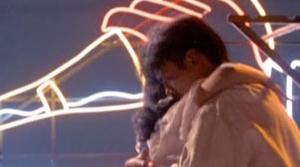
Shanghai Blues (Tsui Hark, 1984)
Cantonese Title: Shanghai zhi ye
Shanghai Blues, one of Tsui Hark's earlier films, is a romantic-comedy set in Shanghai right after liberation from Imperial Japan. It's a delightful romp that tickles the senses and amuses the heart. Shanghai is lit with neon lights, and citizens shield themselves from the rain with brightly colored umbrellas. Although the city is torn with post-war inflation, the atmosphere is pretty much hopeful setting the tone right for a cheerful comedy of errors. Beggars set-up their tents with money gathered from selling their blood, but still insist in camaraderie and music. Nightclubs are littered with perverts and thugs but backstage, the showgirls argue and fight in slapstick coordination. It's really entertaining despite the abundance of on screen corniness.
It starts just before the Japanese invasion. Do-re-mi (Kenny Bee) is a clown who quits performing to join the army and fight for liberation. During a stampede, he accidentally pushes a short-haired girl under the bridge. The two get to know each other's pasts and promise to meet at that exact spot right after the liberation. However, just before they know each other's names, they are again separated by a rioting stampede.
Ten years after, Do-re-mi returns to Shanghai and chances upon ill-fortuned girl Stool (Sally Yeh), who finds herself homeless and money-less when her wallet is snatched from her. Stool is taken home by kind-hearted Shu-shu (Sylvia Chang), a kind-hearted showgirl who coincidentally lives right below Do-re-mi's apartment. Do-re-mi thinks Stool is his mysterious soul mate, when it is actually Shu-shu. The result is a chaotically amusing love triangle that delights in moments and scenes of confusion.
There is constant motion in the plot. Tsui seems unrelenting and uninterested in momentary stops to at least invest in romantic air and silence. The film keeps on moving. A supposed scene that would have the audience sigh a romantically satisfied sigh is disturbed by a comedic punch. Tsui doesn't intend to please himself with rom-com conventions, and instead, picks up the pace of his setting, a Shanghai that has just survived the war and is trying to get back on its knees, only to experience another take-over (not really shown onscreen but you can feel the onslaught of Communism with the beggars calling each other comrades).
It's an impressive early feature for Tsui, who would later make a name for himself as one of Hong Kong's most important directors. Despite the use of typical Hong Kong comedic antics (meaning, there will be a lot of jokes and slapstick moments that seem irrelevant, lowbrow or just plain unfunny), its authentically charming. Tsui infuses songs and dances within the film, lending Shanghai Blues a melodic feel that usually erupts in downright silliness.
Tsui has a natural talent for editing. The final twenty minutes of the film is a frenzied collection of scenes that exclamate in a finale that satisfyingly concludes the entire set-up. Yet Tsui doesn't end the film in a peaceful conclusion but instead stages the reunion in a confusingly crowded train ride to Hong Kong. I know it's cliche but it just fits within the confabulated madness that Tsui stormed up. With all the cat fights, the misunderstandings, the miscommunication, the humorous song and dance numbers, the seemingly pointless plot maneuvering, it is quite understandable why Tsui decided to end with a note of romantic resonance in a backdrop of feverish rowdiness, inside a fast-paced train ride and within the vision of hundreds who are trying to escape the hopelessness of Shanghai for the initial promise of Hong Kong.
0 comments:
Post a Comment